RISEDRONATE 150 MG - ORAL
PHONETIC PRONUNCIATION: (riss-ED-row-nate)
COMMON BRAND NAME(S): Actonel
GENERIC NAME(S): risedronate sodium
Uses
USES: Risedronate is used to prevent and treat certain types of bone loss (osteoporosis) in adults. Osteoporosis causes bones to become thinner and break more easily. Your chance of developing osteoporosis increases as you age, after menopause, or if you take corticosteroid medications (such as prednisone) for a long time. This medication works by slowing bone loss to help maintain strong bones and reduces the risk of broken bones (fractures). Risedronate belongs to a class of medications called bisphosphonates.
How to use RISEDRONATE 150 MG - ORAL
HOW TO USE: Read the Medication Guide and, if available, the Patient Information Leaflet provided by your pharmacist before you start using risedronate and each time you get a refill. Follow the instructions very closely to make sure you absorb as much of the drug as possible and reduce the risk of injury to your esophagus. If you have any questions, ask your doctor or pharmacist. Take this medication by mouth as directed by your doctor, usually once a month. Take it after getting up for the day and before taking your first food, beverage, or other medication. Do not take it at bedtime or while you are still in bed. Take this medication with a full glass of plain water (6 to 8 ounces or 180 to 240 milliliters). Do not take it with any other beverage. Swallow the tablet whole. Do not chew or suck on it. Then stay fully upright (sitting, standing, or walking) for at least 30 minutes, and do not lie down until after your first food of the day. Wait at least 30 minutes after taking risedronate before you eat or drink anything other than plain water and before taking any other medication by mouth. Calcium or iron supplements, vitamins with minerals, antacids containing calcium/magnesium/aluminum, dairy products (such as milk, yogurt), and calcium-enriched juice may interfere with absorption of risedronate. Medications such as quinapril, certain forms of didanosine (chewable/dispersible buffered tablets or pediatric oral solution), sucralfate, and bismuth subsalicylate may also interfere with absorption. Do not take these products for at least 30 minutes after taking risedronate. Take this medication regularly to get the most benefit from it. Choose the day of the month that best fits your schedule. Remember to take it on the same day each month. It may help to mark your calendar with a reminder. Talk to your doctor about the risks and benefits of long-term use of this medication.
Side Effects
Precautions
Interactions
Overdose
Images
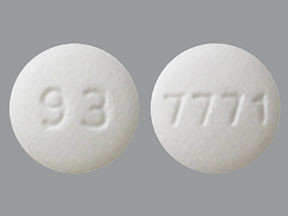
- color
- white
- shape
- round
- imprint
- 93, 7771

- color
- white
- shape
- round
- imprint
- 93, 7771

- color
- white
- shape
- round
- imprint
- 93, 7771
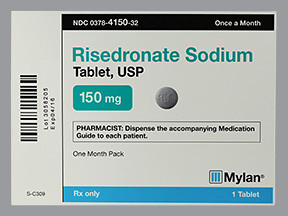
- color
- light blue
- shape
- round
- imprint
- M RE, 150

- color
- light blue
- shape
- round
- imprint
- M RE, 150

- color
- blue
- shape
- oblong
- imprint
- RSN, 150 MG
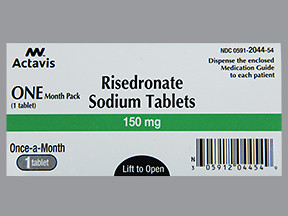
- color
- blue
- shape
- oblong
- imprint
- RSN, 150 MG
Reviews
Faq for RISEDRONATE 150 MG - ORAL
Risedronate 150 mg is an oral medication that belongs to a class of drugs called bisphosphonates. It is commonly used to treat and prevent osteoporosis in postmenopausal women.
Risedronate 150 mg works by slowing down the breakdown of bone and increasing bone mass, which helps in preventing fractures and strengthening bones.
You should take Risedronate 150 mg exactly as prescribed by your doctor. It is typically taken once a month on the same day each month, preferably on an empty stomach with a full glass of water. Do not lie down for at least 30 minutes after taking the medication.
Common side effects of Risedronate 150 mg may include stomach upset, diarrhea, constipation, mild indigestion, headache, and muscle or joint pain. If these side effects persist or worsen, contact your doctor.
Risedronate 150 mg is not recommended for individuals with certain conditions such as low blood calcium levels, kidney problems, difficulty swallowing, or esophageal issues. It is important to discuss your medical history with your doctor before starting this medication.
Certain medications may interact with Risedronate 150 mg, including calcium supplements, antacids, nonsteroidal anti-inflammatory drugs (NSAIDs), and some antibiotics. It is important to inform your doctor about all the medications you are taking to avoid any potential interactions.
The duration of Risedronate 150 mg treatment depends on your individual condition. It is important to follow your doctor's instructions and continue taking the medication for as long as prescribed, unless otherwise advised.
If you forget to take your monthly dose of Risedronate 150 mg, take it the next morning and then return to your regular schedule. Do not take two doses on the same day.
Rarely, Risedronate 150 mg can cause serious side effects such as severe bone, joint, or muscle pain, jaw problems, severe heartburn, difficulty swallowing, or unusual thigh bone fractures. Contact your doctor immediately if you experience any of these symptoms.
Disclaimer
IMPORTANT: HOW TO USE THIS INFORMATION: This is a summary and does NOT have all possible information about this product. This information does not assure that this product is safe, effective, or appropriate for you. This information is not individual medical advice and does not substitute for the advice of your health care professional. Always ask your health care professional for complete information about this product and your specific health needs.
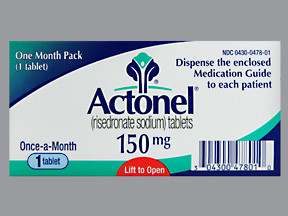
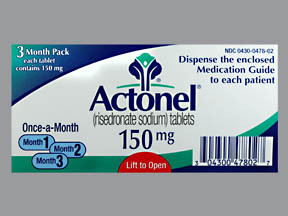
No Reviews Yet